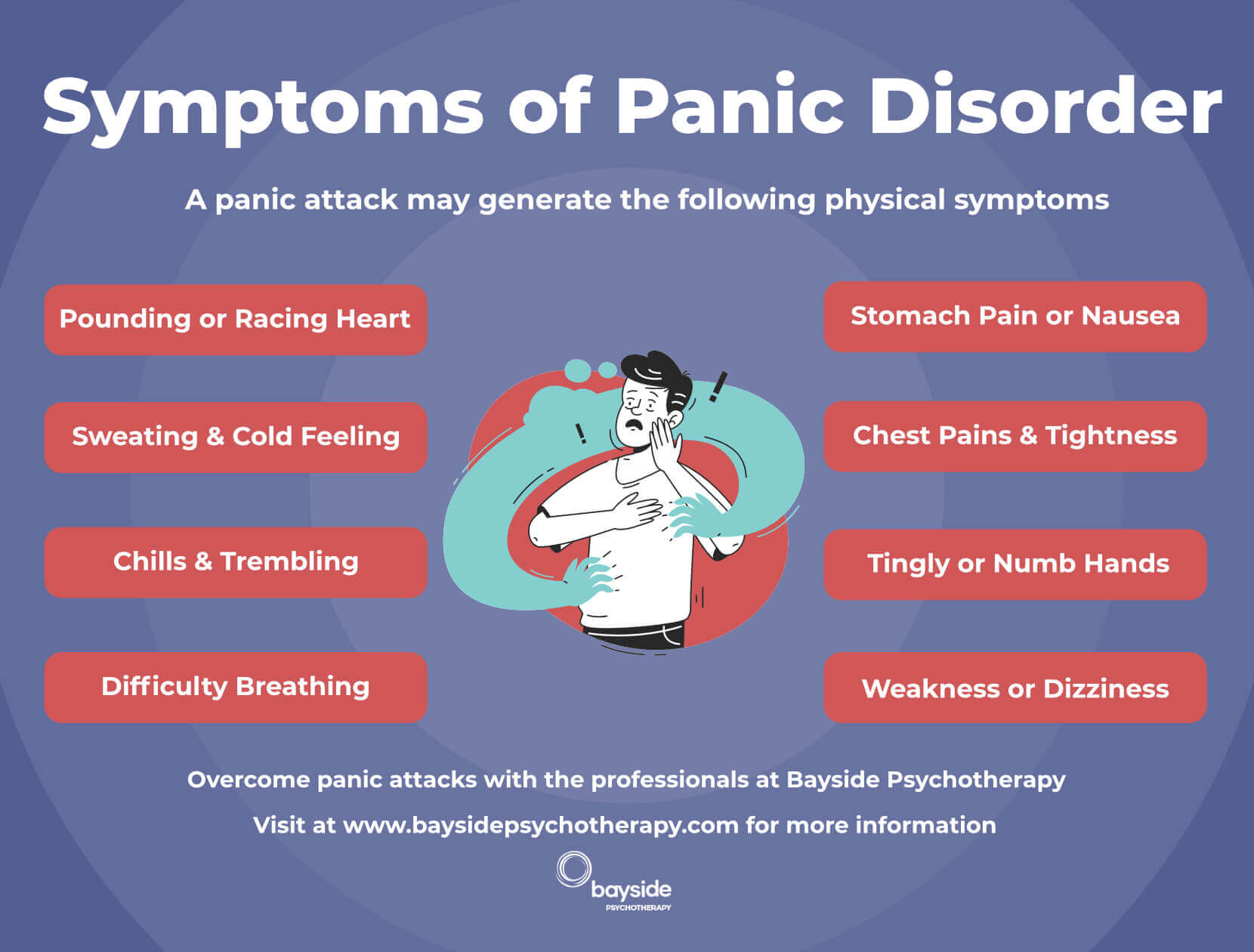What Is Panic Disorder?
Do you ever have the feeling of uncontrollable panic? Are you looking for ways to manage episodes of intense panic?
Feelings of extreme panic can be very distressing and debilitating. Many individuals who experience a panic attack fear experiencing another one due to the intensity of the accompanying physical sensations.
Panic disorder involves the experience of panic attacks followed by ongoing fears of experiencing further panic attack episodes. Panic attacks can trigger very intense physical symptoms, and individuals often believe they are experiencing a cardiac event. As such, the psychological distress associated with a panic attack is often intense.

Panic Attacks Are Sudden
Attacks occur when your physical state stops you from dealing with a situation. The overwhelming anxiety at a psychological and physiological level stops the part of our brain responsible for logic, reasoning and problem solving from functioning.
People with panic disorder often also suffer from anxiety disorder which as they start to feel more anxious, unexpected panic attacks are more likely to occur. Feelings of panic can be brought on by a specific situation like a traumatic memory or by a sudden emotional feeling. Thoughts can also trigger one. The key is to identify the source of your panic attacks and address it. Talking to a mental health professional is the first step in reducing symptoms and eventually overcoming it.

Symptoms of Panic Disorder
A panic attack may generate the following physical symptoms:
- Pounding or racing heart
- Sweating & Cold feeling
- Chills
- Trembling
- Difficulty breathing
- Weakness or dizziness
- Tingly or numb hands
- Chest pain
- Stomach pain or nausea

Treatment For Panic Attacks
If you’re experiencing symptoms of panic disorder, we recommend talking to a member of our team at Bayside Psychotherapy. Once you have discussed your history, we can start to pinpoint the source of why you’re having a panic attack.
Psychotherapy
Psychotherapy treatment can help a sufferer learn ways to stop a panic from occurring. It isn’t easy to stop a panic attack but therapy for panic disorder is a great first step to take to manage symptoms and help prevent panic attacks in future. Exposure therapy is also a common treatment method focused on partaking in activities that may trigger a panic attack, doing this regularly .
Exposure therapy is a common CBT method that focuses on confronting the fears and beliefs associated with panic disorder to help you engage in activities you have been avoiding. This kind of mental health treatment is sometimes used along with stress management and relaxation techniques. Breathing exercises are also very important, deep breathing helps to calm the body and mind and give us something to focus on.
Medication
Health care providers may prescribe medication to treat panic disorder. Different types of medication can be effective, including:
- Antidepressants, such as selective serotonin reuptake inhibitors (SSRIs) and serotonin-norepinephrine reuptake inhibitors (SNRIs)
- Beta-blockers
- Anti-anxiety medications can help reduce symptoms
It is important to remind yourself that the symptoms are temporary and within your control. Learning to manage panic attacks requires being aware of signs and symptoms of panic attacks and then taking the correct steps to stop them from occurring.
Need therapy for panic disorder?
Connect With a Therapist
What Treatment Options Does Bayside Psychotherapy Offer?
Treatment for panic disorder is collaborative between the client and practitioner. It may involve a combination of talking therapy (counselling or psychotherapy) and medication. There is no psychological therapy that is specifically more effective than another although some research has indicated that interventions including CBT (Andrews et al 2018), and psychodynamic psychotherapy may provide assistance.
Treatment may involve talking through the difficulties you are having and developing skills to better manage the physiological components of panic disorder such as deep breathing and relaxation and also exploring the specific factors triggering panic with each individual.
While medication may be an important part of treating panic disorder effectively in certain circumstances, we encourage you to seek advice from your GP or psychiatrist about this as we are not able to prescribe or advise on medication.
Call us on (03) 9557 9113, use our contact form to enquire, or book easily online.
What Triggers Panic Attacks?
Panic Attacks often happen out of the blue, without warning, and sometimes with no apparent trigger. They’re different from an anxiety attack as these are usually brought on by a perceived stressor or threat, while panic attacks typically occur without a trigger.
A panic attack may be a one-time occurrence, although people may experience repeat episodes. Specific situations in which you feel endangered or unable to escape usually trigger recurrent panic attacks – primarily if that situation has caused a panic attack before.
Although the exact causes of panic attacks and panic disorder are unclear, the tendency to have one might actually run in the family. There may also be a connection with major life transitions such as graduating from school, beginning a new job, marriage, or becoming a parent. Severe stress, such as the death of a loved one, divorce, or job loss, can also trigger panic attacks. Medical conditions and other physical causes can also cause panic attacks.

Seek Treatment For Panic Disorder – Bayside Psychotherapy
It is important to remind yourself that the symptoms are temporary and within your control. Learning to manage panic attacks requires being aware of signs and symptoms of panic attacks and then taking the correct steps to stop them from occurring.
Do you have any questions for us? Get in touch with us through our online contact form.
Call Bayside Psychotherapy on (03) 9557 9113 to find out if we’re able to help you. Your call is completely confidential, and there’s absolutely no obligation.
You can also book an appointment by using our online booking form for online appointments. Or, if you prefer, you can book an in-clinic session.
Self-hypnosis may also work well when used in conjunction with counselling. You can download our Panic Disorder Self Hypnosis recording.
This information is informative only and is not to be used for diagnosis or substitution of appropriate assessment and/or treatment by a registered practitioner.









